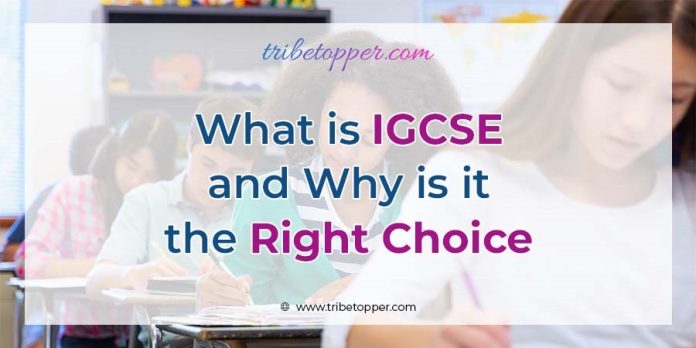Every parent wants their child to enter their final years of education with strong foundations. A different goal could be the national curriculum of the host nation, the International Baccalaureate Diploma Program, AP, or “A” levels. Students worldwide are prepared for higher education through the comprehensive curriculum of the IGCSE (International General Certificate of Secondary Education).
Complete form of IGCSE: International General Certificate of Secondary Education
What is IGCSE?
The British curriculum (GCSE) is the foundation of the IGCSE, which has been modified for a student body that is more globally oriented. Exams administered by the exam board of the school of choice serve as the primary means of assessment. Edexcel and Cambridge Assessment International Education are the most well-known. Thirty languages are among the more than 70 subjects in IGCSE Past Paper offered by the Cambridge Exam Board. Being as inclusive as possible to students with a diverse range of language backgrounds is the goal. They can now carry on learning their mother tongue as a result. Because the IGCSE offers both Core and Extended curriculum papers in some subjects, it accommodates students with varying skill levels.
Why is the IGCSE the Best Option?
IGCSE is the best option because of the following factors:
- A System of Education Recognized Worldwide
The most widely accepted examination credential in the world is the IGCSE. Students who meet these requirements can study in the US, UK, Germany, Canada, Australia, and Singapore, among other nations. The IGCSE curriculum examinations are recognized and accepted by the majority of universities as a requirement for admission. The IGCSE provides a basis for employment and permits additional vocational education. Employers would consider IGCSE students as potential employees because they possess all the necessary skills.
- Selecting Subjects That Take Into Account Various Abilities
Taking into account the wide range of student abilities, the IGCSE offers the option to choose between Core and Extended curriculum papers for specific subjects. Since the Core curriculum is meant to teach the most fundamental knowledge to the majority of students, it is easier than the Extended curriculum. It is anticipated that students who choose the Core Levels will receive grades of C through G. Students who are more academically capable are intended for the Extended Level, which covers the Core level and adds advanced knowledge. Grades A* to E are expected of them.
The IGCSE allows schools to offer over 70 subjects, including 30 languages, in any combination. A minimum of five subjects, one from each of the five subject groups, and a maximum of fourteen subjects—including the required subjects of maths, science, and English—are available for selection by students. The five topic groups consist of the following:
- Humanities and social sciences
- Languages
- Physics
- Mathematics
- subjects that are vocational, technical, and artistic
The student can concentrate on their mother tongue, a subject they are familiar with, by selecting from a broad range of thirty languages for their second language. When selecting subjects, a student can consider his interests, his future academic and professional aspirations, and the subjects he has previously studied and excelled in.
- Assessments
The IGCSE curriculum’s assessment serves the needs of both students who excel academically and those who struggle with it. The questions are divided into different difficulty categories. This type of evaluation aids in the understanding of the student’s strengths and weaknesses by the school. As a result, the students can determine their areas of interest and make decisions about whether to stick with the current courses or switch to new ones. As a result, students’ confidence and morale are raised by the IGCSE curriculum.
- Concentrated on Students
The IGCSE curriculum places a strong emphasis on meeting the needs of the individual student. It provides an engaging learning environment where students and teachers work together to promote creativity in the classroom. Instead of theory-based learning, application-based learning is the approach employed. Students gain a deeper understanding of concepts and enhance their capacity for both logical and creative thought when they know how to apply them appropriately. The student can work with his classmates to share and discuss ideas, question what he learns, and absorb knowledge from everyone.
- Critical Thinking and Logical Thinking
Inquiry-based learning is used in the IGCSE Curriculum in place of traditional rote memorization. The curriculum is, therefore, designed with the goal of fostering critical and logical thinking in students about the subjects they study; as such, it is student-centric. In the process of solving problems, it also strengthens investigative and inferential abilities. Pupils who follow the IGCSE Mock Paper are more flexible and at ease when switching to different curricula. It’s a more straightforward and quicker transition.
- Getting Ready for College
The breadth of knowledge offered by the IGCSE curriculum and the global consistency of education provide students pursuing it an advantage over those pursuing other curricula. They possess the quality and life skills of being independent thinkers and learners, which is necessary for university study and higher education. They are not committing the list of facts to memory in order to pass the test. Students enrolled in IGCSE curricula are already exposed to these responsibilities and traits, and higher education requires that students have an awareness of their learning styles and capabilities.














